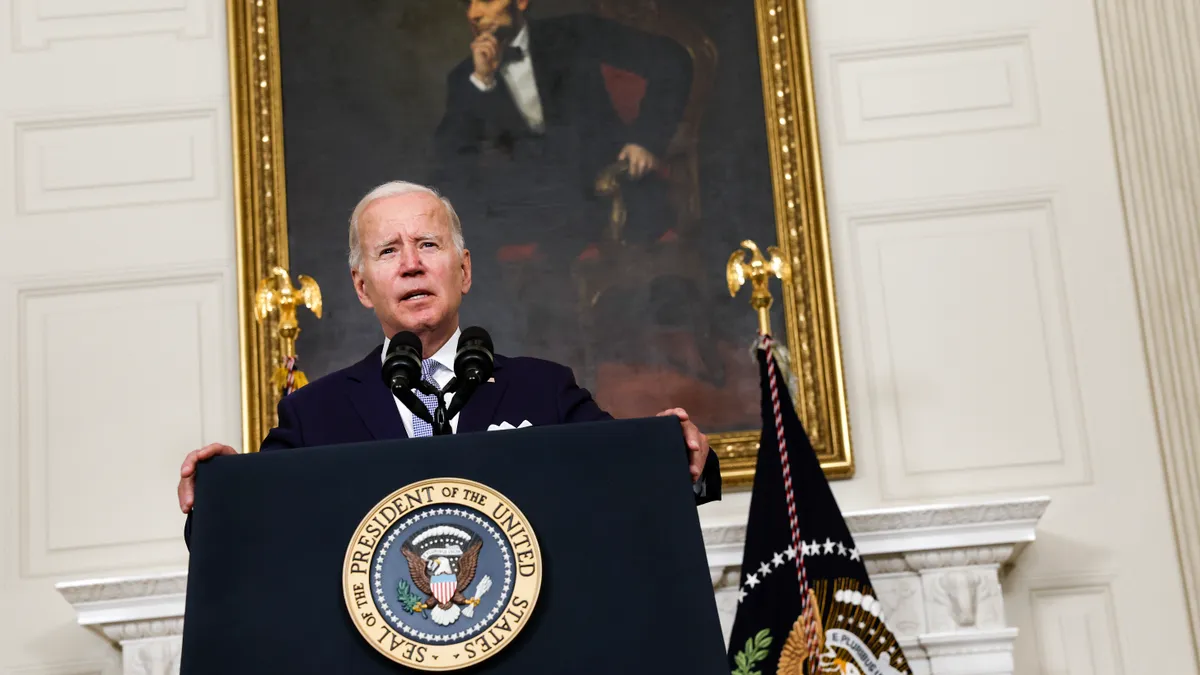A party-line vote in the U.S. Senate Aug. 7 advanced H.R. 5376, also known as the Inflation Reduction Act of 2022, or IRA, bringing a package of legislative proposals affecting areas such as climate change, taxation and — perhaps most significantly for employers — healthcare.
Among its provisions, the latest version of the bill would create a program allowing Medicare to negotiate the price of select pharmaceutical drugs beginning in 2026.
Though efforts to permit Medicare negotiation of drug prices have seen recent support from employer groups, the development also creates potential concerns for employers who will not directly benefit, according to Garrett Hohimer, director, policy and advocacy at the Business Group on Health.
“We understand the importance of Medicare addressing pricing in its drug costs, but focusing only on the Medicare provision sort of forsakes the larger reforms that are needed across the whole system to make it sustainable for all stakeholders,” Hohimer told HR Dive in an interview.
The key concern for employers is that, should Medicare negotiations result in reduced revenues for prescription drug manufacturers, those manufacturers could then seek to recuperate lost profits by charging group health insurance plans — such as those in which employers participate — more.
While BGH does not have exact projections for how much costs are expected to go up in the event that the IRA passes, nor which specific drugs manufacturers may seek to target for cost-shifting, Hohimer said it would be “naive” to dismiss the idea. “It’s just another thing that employers need to be diligent about with their vendors, consultants and [pharmacy benefit managers],” he added. “The market impacts are incredible, and it’s going to be incumbent on employers to watch it.”
Other stakeholders believe that, while cost-shifting may be an outcome of Medicare’s price negotiation ability, this outcome is not necessarily inevitable.
Shandon Fowler, vice president, product marketing at consumer-directed health platform Alegeus, said that Medicare negotiations could help to set a baseline for other negotiators. Another possibility, he noted, is that employers and associations with the right kind of leverage and relationships with PBMs could still lock down more favorable costs for their plan members.
“The main point is that Medicare being able to negotiate these rates is going to have a huge impact on the ecosystem regardless,” Fowler said. “It’s truly yet to be seen whether everyone who is not in Medicare is going to be footing the bill.”
How could ACA subsidy extensions impact the marketplace?
Drug pricing is just one area of interest for employers as the bill makes its way to the desk of President Joe Biden. The House of Representatives is scheduled to vote on the Senate’s version of the IRA Friday, Aug. 12, Speaker of the House Nancy Pelosi said during a press conference Wednesday.
Another of the IRA’s provisions concerns premium subsidies for plans on the Affordable Care Act’s individual marketplace.
In 2021, the American Rescue Plan established premium subsidies with the goal of further expanding health coverage options for U.S. consumers. Federal officials later credited the subsidies, in part, when the percentage of Americans without health insurance dropped to an all-time low of 8% in the first quarter of 2022, Healthcare Dive reported.
These subsidies are set to expire at the end of 2022, but the IRA would extend them into 2025. That represents a “sigh of relief” for individual marketplaces, Fowler said, which may see continued interest from consumers thanks to the extension. Furthermore, greater stability in the ACA marketplace could draw the attention of employers who are weary of increased healthcare costs.
“The stability of [the individual] market makes it appealing for those companies that want to get out of the health insurance underwriting business, so to speak,” Fowler said, adding that the subsidy extension “helps with those options as opposed to being a setback for the stability of those exchanges.”
Employer interest in the individual marketplace is not new, however. Recent federal efforts have sought to expand the ability of employers to forgo traditional group health insurance plans in favor of other frameworks, such as tax-exempt health reimbursement accounts. HRAs were a focus of the Trump administration, which issued regulations in 2020 to allow employers the ability to provide workers funds, through an HRA, to allow them to shop for coverage on the individual marketplace.
So far, the consideration of HRAs has mainly taken place among small and midsize employers, said John Staub, director of outreach at health benefits software firm Remodel Health, though larger employers may soon come around to the idea, too. “We’ve seen the size of employers leaving their group plans grow every single year,” he noted.
Staub said he compares traditional group health plans to pensions in the retirement space; both are legacy models that allow employers some measure of control, but they are also costly. And with healthcare price inflation set to continue for the foreseeable future, alternative models may become even more appealing as the individual market stabilizes, he added.
BGH, which represents mostly large employers, does not oppose the extension of the ACA premium subsidies, Hohimer said in an email. “As for trends, our members believe their plans play an important role in the health and well-being of their workforce,” he noted.




















